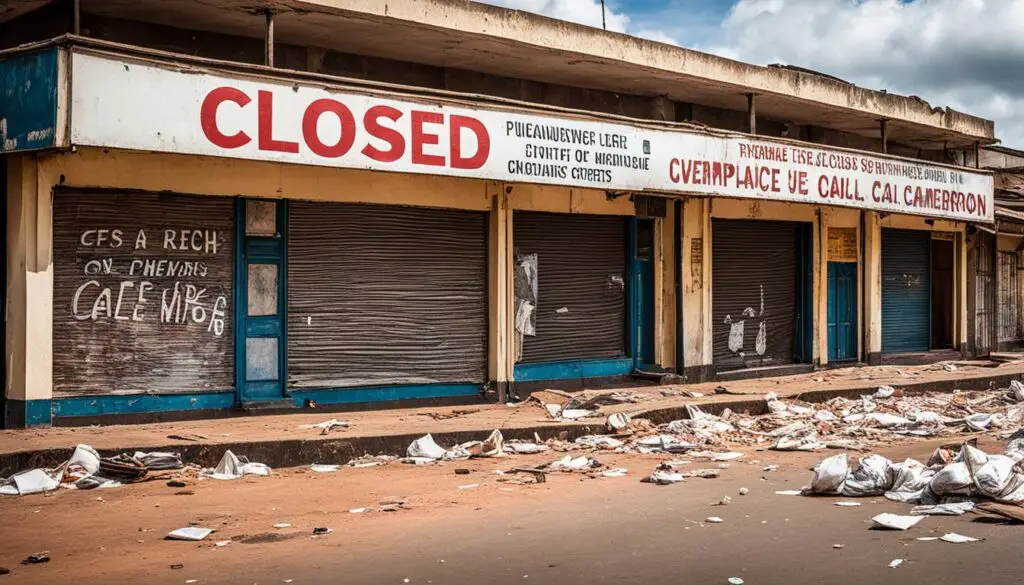Welcome to our article on the Cameroon Anglophone Crisis. In this section, we will provide you with a comprehensive overview of this ongoing conflict that has gripped the nation. The crisis has had a profound impact on the socio-political landscape, causing significant disruptions and hardships for the people of Cameroon.
The Cameroon Anglophone Crisis refers to the conflict between the Anglophone regions, where English is predominantly spoken, and the Francophone regions, where French is the primary language. The crisis is deeply rooted in the historical divide between these two communities and the disparities they face in terms of language rights, political representation, and access to resources.
Throughout this article, we will explore the historical background, causes, and key players involved in the Cameroon Anglophone Crisis. We will also examine the escalation of the conflict, the international response, the resulting humanitarian crisis, and the economic impact.
As we delve into each section, we aim to provide you with a comprehensive understanding of the Cameroon Anglophone Crisis, shedding light on the complexities and challenges faced by the people of Cameroon. Our goal is to raise awareness about this pressing issue and emphasize the urgent need for a peaceful resolution.
Key Takeaways:
- The Cameroon Anglophone Crisis is a conflict between the English-speaking Anglophone regions and the French-speaking Francophone regions of Cameroon.
- The crisis stems from historical divisions, including language differences and political marginalization of the Anglophone community.
- The escalation of the crisis has led to protests, government crackdowns, and the displacement of civilians.
- The international response has focused on human rights advocacy and mediation efforts.
- The crisis has resulted in a severe humanitarian situation with mass displacement and limited access to basic needs.
Historical Background of the Cameroon Anglophone Crisis
In order to fully comprehend the complexities of the Cameroon Anglophone Crisis, it is crucial to examine the historical background that gave rise to this conflict. The crisis is rooted in the division between the Anglophone and Francophone regions of the country, influenced by language differences and political marginalization.
The Anglophone regions, located primarily in the Northwest and Southwest regions of Cameroon, have a distinct historical and cultural background. During colonization, Cameroon was ruled by both the British and the French. As a result, the country was partitioned into two distinct regions, with the Anglophone areas falling under British rule and adopting English as the primary language.
Following independence, Cameroon emerged as a united nation. However, the Anglophone regions soon began to express concerns over the erosion of their cultural identity and the perceived domination of Francophone authorities. Anglophone grievances centered around language policies, educational disparities, and the concentration of political power in Francophone regions.
The government’s response to these grievances further exacerbated tensions. The Anglophone regions felt marginalized and discriminated against, leading to the emergence of various separatist movements. Calls for greater autonomy and recognition of the Anglophone population’s rights intensified, eventually escalating into a full-blown crisis.

As the image above illustrates, the historical background of the Cameroon Anglophone Crisis lays the foundation for understanding the current state of unrest. The division between the Anglophone and Francophone regions, along with the grievances of the Anglophone community, have fueled the conflict and drive the ongoing push for resolution and justice.
Causes of the Cameroon Anglophone Crisis
In order to fully comprehend the Cameroon Anglophone Crisis, it is crucial to examine the underlying causes that have fueled this ongoing conflict. The grievances of the Anglophone community have been a significant factor in the unrest, leading to a deep sense of frustration and disillusionment.
The erosion of the cultural identity of the Anglophone regions has been a major cause for concern. The Anglophone community feels marginalized and neglected, with their language and traditions being undervalued. This erosion of their cultural heritage has created a sense of alienation and resentment.
Additionally, the limited access to quality education and opportunities has further exacerbated the grievances of the Anglophone community. The lack of investment in schools, infrastructure, and economic development in the Anglophone regions has left many feeling left behind and deprived of a prosperous future.
Furthermore, the government’s response to these grievances has been a critical contributing factor to the escalation of the crisis. The heavy-handed approach, characterized by the use of force and repression, has only deepened the divisions and fueled the anger within the Anglophone community.
To gain a comprehensive understanding of the Cameroon Anglophone Crisis, it is vital to highlight these causes and acknowledge the deep-rooted grievances of the Anglophone community. It is only through addressing these core issues and implementing meaningful reforms that a path towards reconciliation and resolution can be found.

Escalation of the Cameroon Anglophone Crisis
In this section, we explore the escalation of the Cameroon Anglophone Crisis, examining the protests that erupted in the Anglophone regions and the subsequent government crackdown.
Protests in the Anglophone Regions
The escalation of the crisis saw a surge in protests across the Anglophone regions of Cameroon. Fueled by long-standing grievances, including the erosion of cultural identity and limited access to education and opportunities, demonstrators took to the streets to demand a more inclusive and equitable society.

Government Crackdown
In response to the protests, the Cameroonian government implemented a heavy-handed crackdown, employing tactics that resulted in the use of violence and excessive force against the demonstrators. The government’s response further fueled tensions and deepened the divide between the Anglophone and Francophone communities.
The crackdown not only affected the protesters but also led to the displacement of civilians and the disruption of daily life in the affected regions. The violence and insecurity have had a profound impact on the local communities, creating a climate of fear and instability.
Despite the escalating tensions, there is a pressing need for dialogue and a peaceful resolution to the crisis. Only through open and inclusive discussions can the grievances of the Anglophone community be addressed, and a path towards reconciliation and unity be forged.
International Response to the Cameroon Anglophone Crisis
Amidst the ongoing Cameroon Anglophone Crisis, the international community has been actively involved in addressing the conflict and advocating for human rights. International organizations and countries have recognized the importance of mediating the crisis and finding a peaceful resolution.
Various international organizations, such as the United Nations and the African Union, have expressed concern about the human rights violations and violence occurring in the Anglophone regions. They have called for an end to the conflict and the protection of human rights for all individuals affected.
Furthermore, several countries have played a pivotal role in mediating the crisis and facilitating dialogues between the Cameroonian government and the Anglophone separatist groups. These mediation efforts aim to foster understanding, promote reconciliation, and find a mutually beneficial solution.
However, the Cameroon Anglophone Crisis presents several challenges to the international response. The complex nature of the conflict, coupled with the deep-rooted grievances and distrust between the parties involved, hinders the progress towards a resolution.
The international community also faces difficulties in effectively coordinating their efforts and ensuring the meaningful participation of all stakeholders. The conflicting interests and priorities of different actors pose additional obstacles to achieving a sustainable peace agreement.
Despite these challenges, the international response to the Cameroon Anglophone Crisis highlights the global commitment to upholding human rights and promoting peaceful solutions to conflicts. Through continued mediation efforts and diplomatic engagement, there is hope for a brighter future for the Anglophone regions of Cameroon.

Humanitarian Crisis in the Cameroon Anglophone Crisis
As the Cameroon Anglophone Crisis unfolds, it has led to a devastating humanitarian crisis, leaving countless people displaced and struggling to access basic needs. The impact of this crisis is particularly dire for vulnerable groups such as women and children.
The mass displacement of civilians is one of the most alarming consequences of this crisis. Families are forced to flee their homes in search of safety, often leaving behind their possessions and livelihoods. This widespread displacement has resulted in overcrowded makeshift camps and a strain on already limited resources.
Access to basic needs such as food, water, and healthcare is severely compromised in areas affected by the crisis. The disruption of essential services and the destruction of infrastructure have further compounded the difficulties faced by the population. Adequate nutrition, clean drinking water, and proper medical care are urgently needed to address the immediate needs of those affected.
Moreover, the humanitarian crisis disproportionately affects women and children. Women face increased risks of gender-based violence, including sexual assault and exploitation, in the midst of the crisis. Children, on the other hand, are denied their right to education and are exposed to traumatic experiences that can have lasting effects on their well-being.
Immediate and sustained international support is crucial to alleviate the suffering caused by the humanitarian crisis in the Cameroon Anglophone Crisis. Humanitarian organizations and aid agencies must be granted access to affected areas to provide essential assistance to those in need. Additionally, efforts must focus on long-term solutions that address the root causes of the crisis, including the restoration of basic services and the promotion of peace and stability.
Economic Impact of the Cameroon Anglophone Crisis
The ongoing Cameroon Anglophone Crisis has had a significant economic impact, both regionally and nationally. The conflict has led to severe disruptions in businesses, resulting in a decline in investments and an increase in unemployment rates.
Business disruptions: Many businesses in the Anglophone regions have been severely affected by the crisis. The frequent closures, curfews, and transportation restrictions have made it challenging for companies to operate smoothly. Small businesses, in particular, have struggled to sustain themselves, leading to layoffs and closures.
Decline in investment: The instability caused by the conflict has also deterred foreign and domestic investments. Investors are hesitant to commit their resources to regions marked by violence and unrest. The decline in investments further hampers job creation and economic growth.
Rise in unemployment rates: As businesses face disruptions and closures, unemployment rates have risen significantly in the affected regions. The loss of jobs has further exacerbated the economic hardships faced by individuals and families. Unemployment also amplifies social tensions and leads to socio-economic inequality.
This economic downturn not only affects the immediate livelihoods of individuals but also has long-term implications for the country’s economy. The reduced economic activity hinders progress in various sectors, such as agriculture, manufacturing, and services. It becomes crucial to address the economic impact of the crisis when seeking a sustainable solution for peace and stability in Cameroon.

Prospects for Resolving the Cameroon Anglophone Crisis
As the Cameroon Anglophone Crisis continues to inflict suffering and unrest, it is crucial to explore the prospects for resolving this complex conflict. Through dialogue and power-sharing, a sustainable peace agreement might be within reach. However, significant challenges must be overcome to achieve a lasting solution.
Dialogue serves as a powerful tool for facilitating understanding and reconciliation between the parties involved. By engaging in open and constructive discussions, all stakeholders can express their grievances and aspirations, creating space for mutual understanding and trust. Dialogue creates an opportunity for compromises to be made and for shared solutions to be found, paving the way for a peaceful resolution.
Power-sharing is another potential avenue for resolving the Cameroon Anglophone Crisis. By distributing political and administrative power equitably among all regions, including the Anglophone and Francophone communities, inclusivity and representation can be promoted. This approach allows the grievances of the Anglophone community to be addressed, fostering a sense of unity and shared responsibility.
However, achieving a resolution is not without its challenges. Deep-rooted divisions and historical grievances must be carefully navigated to build trust and overcome mutual suspicion. Additionally, addressing the socioeconomic and cultural disparities between the Anglophone and Francophone regions is crucial for long-term stability.
Image related to Prospects for Resolving the Cameroon Anglophone Crisis
Resolving the Cameroon Anglophone Crisis requires a commitment to inclusivity and reconciliation. It demands the recognition of the legitimate concerns and aspirations of all parties involved. By fostering dialogue and exploring power-sharing arrangements, a path towards lasting peace can be forged. International support and engagement are essential in facilitating these efforts and ensuring a brighter future for Cameroon.
Conclusion
The Cameroon Anglophone Crisis is a deeply rooted conflict that has caused immense suffering and instability in the country. Throughout this article, we have explored the historical background, causes, escalation, international response, humanitarian crisis, economic impact, and prospects for resolving the crisis.
It is clear that a peaceful resolution is urgently needed to address the grievances of the Anglophone community and restore stability in Cameroon. The international community must play a significant role in supporting and facilitating dialogue between the government and the Anglophone leaders.
By promoting human rights, advocating for inclusive dialogue, and prioritizing the needs of the affected communities, we can work towards a sustainable solution. Rebuilding a united and prosperous Cameroon requires the cooperation and collaboration of all stakeholders, both domestically and internationally.
FAQ
What is the Cameroon Anglophone Crisis?
The Cameroon Anglophone Crisis refers to the ongoing conflict between the Anglophone and Francophone regions of Cameroon. It is characterized by socio-political tensions, protests, government crackdowns, and violence.
What is the historical background of the Cameroon Anglophone Crisis?
The Cameroon Anglophone Crisis has its roots in the historical division between the Anglophone and Francophone regions of the country. The Anglophone regions were formerly under British colonial rule, while the Francophone regions were under French colonial rule. This division has resulted in language differences and unequal treatment, leading to grievances and tensions.
What are the main causes of the Cameroon Anglophone Crisis?
The main causes of the Cameroon Anglophone Crisis include the erosion of Anglophone cultural identity, limited access to quality education and job opportunities for Anglophone citizens, and perceived political marginalization. These factors have fueled discontent and pushed many Anglophone Cameroonians to demand greater recognition and autonomy.
How has the Cameroon Anglophone Crisis escalated?
The Cameroon Anglophone Crisis has escalated through protests in the Anglophone regions, followed by a harsh government crackdown. The protests initially called for linguistic and educational reforms but grew into a broader demand for greater autonomy and recognition. The government’s use of violence and repression has further intensified the conflict.
What has been the international response to the Cameroon Anglophone Crisis?
The international response to the Cameroon Anglophone Crisis has involved human rights organizations and countries calling for an end to violence and respect for human rights. Mediation efforts have been made by international actors to facilitate dialogue and find a peaceful resolution to the conflict, although significant challenges remain.
What is the humanitarian impact of the Cameroon Anglophone Crisis?
The Cameroon Anglophone Crisis has resulted in a severe humanitarian crisis, with mass displacement of civilians, lack of access to basic needs such as food, water, and healthcare, and increased vulnerability for women and children. The conflict has disrupted the lives of thousands of people, causing immense suffering.
How has the Cameroon Anglophone Crisis affected the economy?
The Cameroon Anglophone Crisis has had a significant economic impact, leading to business disruptions, decline in investment, and rising unemployment rates. The conflict has hindered economic development and has the potential for long-term consequences on the national economy.
What are the prospects for resolving the Cameroon Anglophone Crisis?
Resolving the Cameroon Anglophone Crisis requires inclusive dialogue and power-sharing mechanisms. While finding a sustainable peace agreement is challenging, there are prospects for reconciliation and resolution if all stakeholders are willing to engage in constructive dialogue and address the underlying issues.